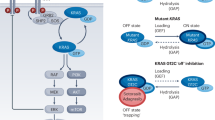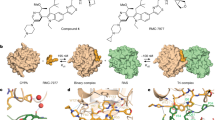Abstract
Background
In EGFR-mutant and MET-amplified lung cancer resistant to EGFR inhibitors, double blockade of EGFR and MET is considered as a reasonable strategy despite increasing toxicity. This study evaluated the single MET inhibition in these specific tumours.
Methods
We investigated the efficacy of a single MET inhibitor in EGFR-mutant, MET-amplified lung cancer cells (HCC827GR) and the matched clinical cases and patient-derived cells. Acquired resistance mechanisms to single MET inhibitor were further explored.
Results
Single MET inhibitor sufficiently inhibited the EGFR downstream signalling and proliferation in the HCC827GR cells. The MET-inhibitor-sensitive clones had similar EGFR mutation allele frequency as the MET-inhibitor-resistant clones. The patients with EGFR-mutant, MET-amplified lung cancer resistant to EGFR inhibitors showed definite response to single MET inhibitor but the response duration was not durable. The MET gene copy number in their plasma circulating tumour DNA was significantly decreased during the treatment and was not re-increased after progression. In the cells resistant to single MET inhibitor, the EGFR pathway was reactivated, and gefitinib alone successfully suppressed their growth.
Conclusions
Single MET inhibition produced a short-lived response in EGFR-mutant and MET-amplified lung cancer. A further study of a novel combination therapy schedule is needed to achieve long-lasting efficacy and less toxicity.
This is a preview of subscription content, access via your institution
Access options
Subscribe to this journal
Receive 24 print issues and online access
$259.00 per year
only $10.79 per issue
Buy this article
- Purchase on Springer Link
- Instant access to full article PDF
Prices may be subject to local taxes which are calculated during checkout





Similar content being viewed by others
Data availability
The datasets used and/or analysed during the current study are available from the corresponding author upon reasonable request.
References
Chan BA, Hughes BG. Targeted therapy for non-small cell lung cancer: current standards and the promise of the future. Transl Lung Cancer Res. 2015;4:36–54.
Fukuoka M, Wu Y, Thongprasert S, Sunpaweravong P, Leong S, Sriuranpong V, et al. Biomarker analyses and final overall survival results from a phase III, randomized, open-label, first-line study of gefitinib versus carboplatin/paclitaxel in clinically selected patients with advanced non-small-cell lung cancer in Asia (IPASS). J Clin Oncol. 2011;29:2866–74.
Lynch TJ, Bell DW, Sordella R, Gurubhagavatula S, Okimoto RA, Brannigan BW, et al. Activating mutations in the epidermal growth factor receptor underlying responsiveness of non-small-cell lung cancer to gefitinib. N. Engl J Med. 2004;350:2129–39.
Mitsudomi T, Morita S, Yatabe Y, Negoro S, Okamoto I, Tsurutani J, et al. Gefitinib versus cisplatin plus docetaxel in patients with non-small-cell lung cancer harbouring mutations of the epidermal growth factor receptor (WJTOG3405): an open label, randomised phase 3 trial. Lancet Oncol. 2010;11:121–8.
Mok TS, Wu Y, Thongprasert S, Yang C, Chu D, Saijo N, et al. Gefitinib or carboplatin-paclitaxel in pulmonary adenocarcinoma. N Engl J Med. 2009;361:947–57.
Rosell R, Carcereny E, Gervais R, Vergnenegre A, Massuti B, Felip E, et al. Erlotinib versus standard chemotherapy as first-line treatment for European patients with advanced EGFR mutation-positive non-small-cell lung cancer (EURTAC): a multicentre, open-label, randomised phase 3 trial. Lancet Oncol. 2012;13:239–46.
Kobayashi S, Boggon TJ, Dayaram T, Jänne PA, Kocher O, Meyerson M, et al. EGFR mutation and resistance of non-small-cell lung cancer to gefitinib. N Engl J Med. 2005;352:786–92.
Pao W, Miller VA, Politi KA, Riely GJ, Somwar R, Zakowski MF, et al. Acquired resistance of lung adenocarcinomas to gefitinib or erlotinib is associated with a second mutation in the EGFR kinase domain. PLoS Med. 2005;2:e73.
Yu HA, Arcila ME, Rekhtman N, Sima CS, Zakowski MF, Pao W, et al. Analysis of tumor specimens at the time of acquired resistance to EGFR-TKI therapy in 155 patients with EGFR-mutant lung cancers. Clin Cancer Res. 2013;19:2240–7.
Ramalingam S, Vansteenkiste J, Planchard D, Cho BC, Gray JE, Ohe Y, et al. Overall survival with osimertinib in untreated, EGFR-mutated advanced NSCLC. N Engl J Med. 2020;382:41–50.
Roper N, Brown A, Wei JS, Pack S, Trindade C, Kim C et al. Clonal evolution and heterogeneity of osimertinib acquired resistance mechanisms in EGFR mutant lung cancer. Cell Rep Med. 2020;1:100007.
Sequist LV, Waltman BA, Dias Santagata D, Digumarthy S, Turke AB, Fidias P, et al. Genotypic and histological evolution of lung cancers acquiring resistance to EGFR inhibitors. Sci Transl Med. 2011;3:75ra26.
Engelman JA, Zejnullahu K, Mitsudomi T, Song Y, Hyland C, Park JO, et al. MET amplification leads to gefitinib resistance in lung cancer by activating ERBB3 signaling. Science. 2007;316:1039–43.
Sequist LV, Han J, Ahn M, Cho BC, Yu H, Kim S, et al. Osimertinib plus savolitinib in patients with EGFR mutation-positive, MET-amplified, non-small-cell lung cancer after progression on EGFR tyrosine kinase inhibitors: interim results from a multicentre, open-label, phase 1b study. Lancet Oncol. 2020;21:373–86.
Wu Y, Cheng Y, Zhou J, Lu S, Zhang Y, Zhao J, et al. Tepotinib plus gefitinib in patients with EGFR-mutant non-small-cell lung cancer with MET overexpression or MET amplification and acquired resistance to previous EGFR inhibitor (INSIGHT study): an open-label, phase 1b/2, multicentre, randomised trial. Lancet Respir Med. 2020;8:1132–43.
Turke AB, Zejnullahu K, Wu Y, Song Y, Dias Santagata D, Lifshits E, et al. Preexistence and clonal selection of MET amplification in EGFR mutant NSCLC. Cancer Cell. 2010;17:77–88.
Jo M, Stolz DB, Esplen JE, Dorko K, Michalopoulos GK, Strom SC. Cross-talk between epidermal growth factor receptor and c-Met signal pathways in transformed cells. J Biol Chem. 2000;275:8806–11.
Eser PÖ, Paranal RM, Son J, Ivanova E, Kuang Y, Haikala HM, et al. Oncogenic switch and single-agent MET inhibitor sensitivity in a subset of EGFR-mutant lung cancer. Sci Transl Med. 2021;13:eabb3738–eabb3738.
Ou SI, Agarwal N, Ali SM. High MET amplification level as a resistance mechanism to osimertinib (AZD9291) in a patient that symptomatically responded to crizotinib treatment post-osimertinib progression. Lung Cancer. 2016;98:59–61.
Wang W, Wang H, Lu P, Yu Z, Xu C, Zhuang W, et al. Crizotinib with or without an EGFR-TKI in treating EGFR-mutant NSCLC patients with acquired MET amplification after failure of EGFR-TKI therapy: a multicenter retrospective study. J Transl Med. 2019;17:52.
van Veggel B, de Langen AJ, Hashemi S, Monkhorst K, Rosenberg EH, Heideman DAM, et al. Crizotinib treatment for patients with EGFR mutation positive NSCLC that acquire cMET amplification after EGFR TKI therapy results in short-lived and heterogeneous responses. Lung Cancer. 2018;124:130–4.
Yoshimura K, Inui N, Karayama M, Inoue Y, Enomoto N, Fujisawa T, et al. Successful crizotinib monotherapy in EGFR-mutant lung adenocarcinoma with acquired MET amplification after erlotinib therapy. Respir Med Case Rep. 2017;20:160–3.
Baldacci S, Mazieres J, Tomasini P, Girard N, Guisier F, Audigier Valette C, et al. Outcome of EGFR-mutated NSCLC patients with MET-driven resistance to EGFR tyrosine kinase inhibitors. Oncotarget. 2017;8:105103–14.
Jänne PA, Shaw AT, Camidge DR, Giaccone G, Shreeve SM, Tang Y, et al. Combined Pan-HER and ALK/ROS1/MET inhibition with dacomitinib and crizotinib in advanced non-small cell lung cancer: results of a phase I study. J Thorac Oncol. 2016;11:737–47.
Wu Y, Zhang L, Kim D, Liu X, Lee DH, Yang JC, et al. Phase Ib/II study of capmatinib (INC280) plus gefitinib after failure of epidermal growth factor receptor (EGFR) inhibitor therapy in patients with EGFR-mutated, MET factor-dysregulated non-small-cell lung cancer. J Clin Oncol. 2018;36:3101–9.
Arcila M, Lau C, Nafa K, Ladanyi M. Detection of KRAS and BRAF mutations in colorectal carcinoma roles for high-sensitivity locked nucleic acid-PCR sequencing and broad-spectrum mass spectrometry genotyping. J Mol Diagn. 2011;13:64–73.
Ou SI, Govindan R, Eaton KD, Otterson GA, Gutierrez ME, Mita AC, et al. Phase I results from a study of crizotinib in combination with erlotinib in patients with advanced nonsquamous non-small cell lung cancer. J Thorac Oncol. 2017;12:145–51.
Wang R, Yamada T, Kita K, Taniguchi H, Arai S, Fukuda K, et al. Transient IGF-1R inhibition combined with osimertinib eradicates AXL-low expressing EGFR mutated lung cancer. Nat Commun. 2020;11:4607.
Acknowledgements
The authors would like to thank to medical illustrator Suhyun Chae for the preparation of the excellent illustrations. This study was presented in part at the 2018 American Association for Cancer Research, April 14–18, 2018, in Chicago, Illinois.
Funding
This study was supported by a National Cancer Center grant (grant number 2210740-2).
Author information
Authors and Affiliations
Contributions
Y-RC: methodology, validation, formal analysis, investigation, data curation, writing—original draft, visualisation, writing—review & editing, project administration. EHK, SK, S‑YP and J-YH: resources and methodology. YL: conceptualisation, methodology, validation, formal analysis, investigation, data curation, writing—original draft, visualisation, writing—review & editing, project administration, supervision and funding acquisition.
Corresponding author
Ethics declarations
Competing interests
Youngjoo Lee; consulting fee: Roche, Merck, Yuhan, Bayer. Ji-Youn Han; research grants: Roche, ONO, Pfizer and Takeda; consulting fee: Astra Zeneca, BMS, Eli Lilly, Merck, Novartis, Pfizer, Abion, Jints Bio; honoraria for lecture: Astra Zeneca, BMS, Merck, Takeda and Novartis. The remaining authors declare no competing interests.
Ethics approval and consent to participate
This study was performed with approval from the National Cancer Center Institutional Review Board (approval number NCC2016-0208). All patients provided written informed consent.
Consent for publication
Not applicable.
Additional information
Publisher’s note Springer Nature remains neutral with regard to jurisdictional claims in published maps and institutional affiliations.
Supplementary information
Rights and permissions
Springer Nature or its licensor (e.g. a society or other partner) holds exclusive rights to this article under a publishing agreement with the author(s) or other rightsholder(s); author self-archiving of the accepted manuscript version of this article is solely governed by the terms of such publishing agreement and applicable law.
About this article
Cite this article
Choi, YR., Kang, E.H., Kim, S. et al. Single targeting of MET in EGFR-mutated and MET-amplified non-small cell lung cancer. Br J Cancer 128, 2186–2196 (2023). https://doi.org/10.1038/s41416-023-02264-4
Received:
Revised:
Accepted:
Published:
Issue Date:
DOI: https://doi.org/10.1038/s41416-023-02264-4
This article is cited by
-
Afatinib/crizotinib
Reactions Weekly (2024)



